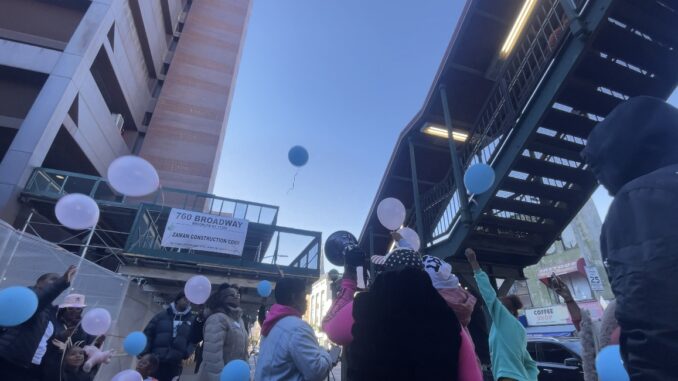
BY HAILEY COGNETTI
In New York City, Black women are nine times more likely to die during childbirth compared to their White counterparts. This alarming statistic, combined with the deaths of three Black women at Woodhull, inspired a rally outside the hospital on Nov. 16. They chanted “Shame on you, Woodhull!”
Protesters demanded answers for the deaths of three Black women who recieved maternity care at Woodhull hospital since 2020: Bevorlin Garcia Barrios, Sha Asia Washington Semple, and Christine Fields. Christine Fields’ and Sha Asia Washington Semple’s families organized the rally, with the help of the Movement To Birth Liberation NY. The rally highlighted the ongoing maternal mortality crisis that disproportionately impacts Black women and Black birthing people in NYC.
According to the New York State Board for Professional Medical Conduct, Dr. Dmitry Anatolevich Shelchkov incorrectly performed an epidural and failed to perform an oxygen treatment to Washington-Semple, which resulted in her death at just the age of 26 in 2020.
Fields’ family say it has yet to receive a complete explanation as to why she bled to death during her emergency Cesarean section surgery in 2023.
Bevorlin Garcia Barrios was the most recent woman to die in childbirth at Woodhull after an emergency Cesarean section on Sept. 15.
According to The New York Times, Chris Miller, a spokesperson for the city’s public hospital system declined to answer questions about the deaths at Woodhull because of medical privacy laws.
The NYC Department of Health and Mental Hygiene reported 51 maternal related deaths in 2020. Woodhull, located between Bedford-Stuyvesant and Bushwick, is one of 11 city-owned hospitals.
At the rally, Dr. Andratta Mitchell, an advocate for maternal justice, addressed the crowd, highlighting the urgency of holding the healthcare system accountable.
“We will not sit back while another Black or Brown sister is killed in this hospital,” Dr. Mitchell said. “Murdered. There are no answers, there is no diagnosis for an answer, and we are coming here to let you know we are going to show up, we are going to show out. I don’t care if it’s just two of us, we are going to be here.” Her message was not only a call to action but a promise to the families grieving these losses.
José Ramon Perez, the fiancé of Christine Fields, spoke through his grief, calling for laws to hold negligent doctors accountable.
“It’s not just about policy – it’s about laws,” Perez said. “The doctor that murdered Christine, he just got fired from Woodhull and now practices OBGYN in Pennsylvania. We need laws in place to stop these doctors from being fired and going somewhere else to practice.”
Those at the rally demanded systemic reforms, including increased funding for public hospitals, and stricter accountability for medical professionals.
Dr. Judith Naraine, a maternal health advocate, spoke about the history of inequity in healthcare and the need for continued, persistent activism to challenge the status quo. Dr. Naraine also spoke to the silence that often surrounds these injustices until they affect a family directly.
“We voted for people in office so they must hear what we are going through in these hospitals, no more silence about this issue, we have to speak about what’s going on in these hospitals and hold people accountable for what they’re doing,” Dr. Naraine said. “They might be fired from one hospital and they go to different practices and still continue with their life while we are suffering, while we are going through so much.”
Before the rally began, Katy Cecen, a registered nurse, talked about the need for systemic solutions to the problems at Woodhull. Cecen is the central coordinator of the Movement To Birth Liberation NY, a non-hierarchical network of reproductive justice and birth activists.
Cecen’s journey into advocacy was born from personal witness to systemic failures. “I got involved in that because when I was working as a registered nurse at SUNY Downstate, which is over 90% Black,” Cecen said. “Over eight infants and three mothers died preventably during my time there and it really radicalized me.”
Cecen has since dedicated herself to birth and reproductive justice work. She has worked closely with Christine Fields’ family for more than a year, helping to organize protests and providing emotional and logistical support.
Cecen emphasized that inequities in maternal care are not new but are deeply entrenched in the history of healthcare inequities in the U.S.
“When we’re talking about the problems here at Woodhull, nothing here is new. In 1935 is the first year that we took records of maternal mortality by race and the racial disparity was 1-1.5,” she said. “Today in New York City, the racial disparity between White and Black women is 1-8. It has only gotten significantly worse since the 1930s. The 1850 Black and White infant mortality ratio was 1-2, today in New York City it’s 1-5.”
Cecen believes that various public hospitals, including Woodhull, Brookdale, SUNY Downstate, and Kings County Hospital Center, are disproportionately affected by systemic inequities, including chronic underfunding and hiring freezes, which deeply affect safety.
“The safety issues were well known with the doctor who was involved in Sha Asia Semple’s case and it was well known during a hiring freeze.” Cecen said.
In the face of these daunting statistics and a system that has left so many behind, the rally’s message was clear: action and solidarity are key. Alice Lowman, Chairwoman of Community Board 5, representing East New York, offered a message of support, echoing the unity felt throughout the rally.
“You’re not standing here alone. We stand here with you. When one of us hurts, we all hurt,” Lowman said.
While the rally was a call to action, it was also a moment of mourning. The event concluded with a balloon release – a tribute to the Black lives lost.
